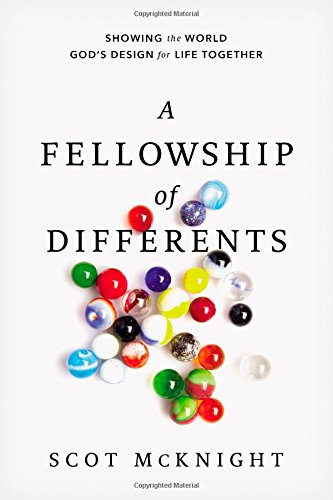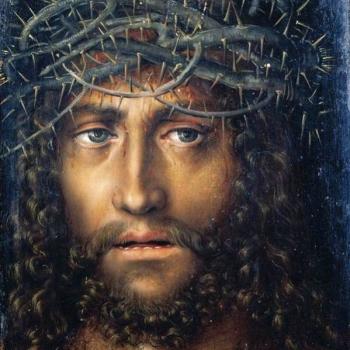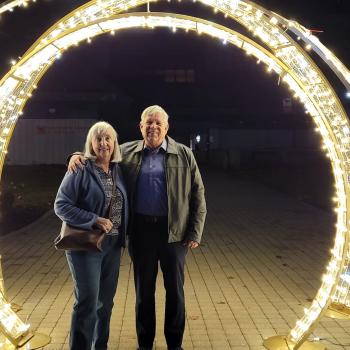Ben: Scot it seems that I’ve been reading a lot of your recent offerings ranging from Jesus is Lord, and little Caesar is not, (it’s a pizza), to your book on the Kingdom, and most recently to A Fellowship of Differents (Zondervan, 2014), a book on the nature of the church. What has prompted all this recent useful productivity?
Scot: Thanks Ben, and I appreciate your reading those books. In about 2000 I made a decision that I wanted to write for the church as well as the academy. Because of the blog, which began in 2005, I’m able to keep my ear fairly close to the ground on current concerns. My books are aimed at ongoing concerns in the church. Whether folks agree with my own take on things, the topics of the Christian life (the Jesus Creed books, One.Life), atonement (A Community called Atonement), Bible interpretation (Blue Parakeet), and now this recent shift to speak into theological concerns (gospel, kingdom, church), are each in their own way pressing concerns for many of us.
One more on this: I don’t write to affirm what most of us already believe; others can do that better than I can. My topics are ones on which I think we need to re-examine what the Bible says.
Ben: Let’s talk about your analogy between the salad bowl (and its salad, you say ideally like a mixed salad), and the church. It’s interesting because sociologists have often said that is what multi-ethnic America is like. Are you suggesting the church simply ought to mirror the culture, or are you pushing for something more?
Scot: Yes and No. Yes in that our churches – a local church – ought to seek reconciliation with God and ourselves among all people in our demographic. If our community is filled with ethnic diversity, we fail if our church is mono-ethnic; and if our community is mono-ethnic, we don’t need to drive miles and miles to get some folks into our church so we can feel better about inclusiveness.
Here’s the fundamental principle: the Good Samaritan. Whoever is on our path is our “neighbor” to love and that is where the salad bowl needs to begin.
Sociologists also tell us that Sunday morning 11am is the most segregated our of the week – I don’t, by the way, know if that is the result of study or someone’s prophetic accusation. I do know the church ought to be the community’s template of breaking down boundaries because God loves all and summons all to the place of grace.
Ben: One of the things that struck me about all the ingredients you mentioned go into the mixed salad which is a church is that most congregations in most small towns, villages, and especially in rural areas could never even strive for that much diversity, at least ethnically and culturally. This seems to be a largely urban vision of church. Yes?
Scot: In some ways, Yes. Apart from what I said in the previous question, we know that rural communities often have a Methodist church on one corner, a Presbyterian church on another, a Catholic church over there and a Baptist church over here. We all know that in those communities there are relations that are unreconciled, people who set themselves above and apart, and folks who think they are superior to others … and right there the salad bowl says, “That is not God’s way.”
Ben: To me one of the big helpful take aways from this book is that the basic under-girding principle that makes it possible for the church to reflect all kinds of ethnic, cultural, socio-economic, racial, educational diversity is the premise that we are all Christians under construction, or put another way, salvation is a process, and we are all in process because we all sin and fall short of God’s highest and best for us. So the church must start with people where they are, welcome and love them there, but envision them and encourage them to be all that God wants them to be as they work our their salvation with fear and trembling. Am I reading you right? And if so, of course that leads to some tricky pastoral work, for example the pastor might only begin to nudge the new Christian away from pornography addiction, but would be more insistent and hold more accountable the more mature Christian with the same issue— right??
Scot: Yes, salvation is a process. There are three tenses of salvation: we have been saved, we are being saved, and we will be saved. We are in the second and third phases and that means we are each on a journey that means respect for where the other person is.
Yes, pastoral care entails knowing the person and knowing the community and knowing the past and the future … not infallibly but out of the wisdom of pastoral discernment. As Paul told the Colossians that they were to know how to answer “each person” (Col 4:6), so the pastoral stuff in a church will wisely know how to work with each person.
Ben: In perhaps one of your most influential books about ‘the Jesus Creed’ (i.e. Jesus’ modification of the Shema), you stress that love of course is central to God’s character and we are supposed to be like Christ in this regard, and this gives us a certain freedom in Christ, for example freedom to not have to keep the Mosaic covenant any longer. And yet of course love is actually COMMANDED by Jesus and so it must be referring to a decision of the will, and obedience to God’s will. My point is, the freedom Paul talks about is freedom from the world, the flesh, and the Devil, so to speak. Not freedom from all God’s commandments. Indeed it would seem that we have been set free from sin so we can obey the law the Christ by the power of the Spirit.
What role does keeping Christ’s law or commandments play in your vision of the process of salvation and the church becoming all it ought to be?
Scot: You’ve nabbed me in one respect. I originally had a chapter for this book on the network of obedience but neither I nor my editor liked it … we just didn’t think it was working as a chapter for this book ought to work. But in another respect the theme of obedience to Christ is throughout the chapters on holiness and newness. The chapter on freedom is followed up with a chapter on faithfulness, which can be seen as a slightly different take on obedience.
Those who are awakened by God’s grace to the goodness of God in Christ are transformed into obedient people because they are both attentive to the Lord and surrendered to the Lord.
Ben: There is a great deal of discussion about the fruit and the gifts of the Spirit in this book, and clearly you want to hold in tension the yen and yang between Spirit and structure, between the new wine and the wineskins, between spontaneity and order. Where do you see the sweet spot in that sort of balancing act, and how does a church achieve it without either quenching the Spirit or becoming all too much like the chaotic Corinthian congregation?
Scot: I wish I knew where the sweet spot was. Rather, the sweet spot that balances spiritual discernment and passing on the tradition is a dynamic of context, church and person. This sort of discernment isn’t inspiration or infallibility but a locally shaped discernment for that local congregation, or in the case of larger bodies, denominations. The Catholics and Orthodox have healthy discussions of this, sometimes maligned by way of ignorance on the part of Protestants, and all seems to come down to knowing how best to express faithfulness to the tradition in a new situation. I’m for that … and I’m against making too many rules. We run the risk in this matter of becoming hidebound traditionalists and wild-eyed enthusiasts, but the Spirit is given to us to keep us faithful.
Ben: At one point in the book, you say that the local church is the hope of the world. For a minute I thought that was a slip up, and you meant to say Christ is. Talk to us a bit about the interface between Christ and his body, between Christology and your vision of ecclesiology. For my part I would prefer to say that the local church at its best is simply the local expression of ‘the one true church apostolic and universal’. In other words I would not want to talk about church with a little c without talking about church with a big C, though I would agree that, like politics, in one sense all churches are local. Unpack your ecclesiology a bit for our readers.
Scot: The expression of the “local church is the hope of the world” is a Bill Hybels line, one that he often uses and one I’ve grown used to using myself – because I believe God is working in this world through the church.
The church, a local church, is the Body of Christ, a local Body of Christ. I cannot emphasize enough that Christ and his Body are in union and one can’t love the Bridegroom without loving his Bride, the church.
Most importantly, modernity and postmodernity have wreaked havoc in the church with individualism and the notion that each of us is captain of our own soul. Yes, but there’s danger lurking there. Each of us accountable to God as a person but God is at work building the church and not simply individual Christians.
I have grown to like “Church” for the universal sense of church and “church” for the local expressions. I have a chapter on Ecclesiology in The Routledge Companion to Modern Christian Thought.
Ben: Probably my favorite chapter in the book at this point is the one about love being a series of prepositions (not to be confused with a series of propositions). Love is for, with, by, thru, unto etc. Unpack what you mean by this for our readers.
Scot: When I wrote The Jesus Creed, which expounds loving God and loving others as the two most important marks of Christian spirituality and maturity I was toying with a definition of love that I thought was in need of further thinking and exegesis. So I held off until I was satisfied with a fully biblical sense of love.
Love as most understand it today is (1) shaped by our culture, not the Bible, and (2) mostly reducible to a sense of affection and deep emotion. The latter are involved but the Bible leads me to think of love in a different way:
First, we must let God’s love for Israel, for his Son, and for the church define what love is. Not the English/American dictionary.
Second, God’s love can be set into four basic elements: (1) a rugged commitment (my translation of “covenant”) to a person (2) to be with that person as (3) someone who is for that person, and (4) this commitment is shaped toward God’s design for us – let us call it Christlikeness (several words will work). I call points 2-4 the principles of presence, advocacy and direction. Love is not tolerance; love is not reduced to emotion; love is a choice and a commitment that endures; love is revealed in time with, and the sense of for-ness (advocacy) and, with others in this world, we are engaged in a direction of helping one another become Christlike.
Ben: Thanks again Scot for making rich and complex Christian concepts and ideas clear and accessible for so many. I was once told that one of the greatest gifts is the ability to distill to any level of discourse even the mysteries of our faith, and its clear to me you have that gift. Keep on writing!
Scot: Ben, blessings to you and all you’re doing in seeking and following God, teaching the Bible and preaching the gospel!
















